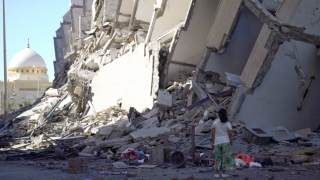
Over the last two weeks there has been a surge of violence in the Occupied Palestinian Territories and Israel.
Days of sustained bombardment by the Israeli Defence Forces have killed more than 200 people in Gaza, including dozens of children, and damaged over 50 schools, as well as the Al Jazeera offices and central COVID-19 testing lab. The firing of rockets by Hamas and other militant groups has also claimed the lives of at least 12 people and injured hundreds.
While a fragile ceasefire holds for the time being, the status quo is far from a state of peace. This recent flare-up comes after decades of violence, human rights violations and blockade, now compounded by COVID-19. Speaking at the UN General Assembly on 20 May, Secretary-General António Guterres said: “If there is a hell on earth, it is the lives of children in Gaza.”
All states have a responsibility to protect civilians. UNA-UK believes the UK has a special responsibility - as a permanent member of the UN Security Council, former colonial power in the region, and the world’s second-largest arms exporter, including at least half a billion in export licences to Israel over the past decade.
We call on the UK to use all tools at its disposal to support a humanitarian assistance, accountability, and sustainable peace, including:
- Humanitarian aid. The humanitarian situation in Gaza was already of deep concern, with the percentage of those living in poverty expected to increase to 64% this year. We welcome the UK’s commitment to provide an initial £3.2 million to UNRWA’s emergency flash appeal. UK funding has been crucial in enabling this UN agency to continue its vital work. With a record number of people in Gaza and across the world in dire need, we urge the UK to reverse its planned aid cuts. We also ask the UK to advocate for unfettered humanitarian access on the ground.
- Suspension of arms exports. Since 2014, the UK has approved 834 standard licences for arms exports to Israel worth £413 million. It has also issued 47 open individual export licences, which place no upper limits on the quantity or value of arms. Sales have included equipment for missiles and components for combat helicopters, aircraft and unmanned air vehicles. As was made clear by the Independent, UK exported military equipment is integral to the Israeli Defence Forces' capabilities, including during the recent Gaza airstrikes. The UK championed the creation of the Arms Trade Treaty, which requires the UK to refuse exports where there is a risk they would undermine peace and security or could be used to commit or facilitate a serious violation of international humanitarian law or international human rights law. We urge the UK to suspend arms export licences to Israel until demonstrable progress is made towards a lasting solution.
- Influence at the United Nations. While the UN’s political role in this situation is limited - both as an actor and a forum, they remain important tools. Coordinated action across the UN system would demonstrate international unity of purpose, as well as support practical steps to improve the situation on the ground.
- We urge the UK to be a vocal champion at the Security Council for humanitarian access, accountability - including the ongoing investigation by the International Criminal Court, and a lasting political solution based on countless previous UN resolutions. When the Security Council is not able to discharge its responsibilities effectively, we encourage the UK to work creatively with the wider UN membership to ensure the Israel-Palestine situation is addressed in other forums.
- At the Human Rights Council, which is holding a special session on the situation tomorrow, we urge the UK to call for an investigative mechanism to collect evidence of violations of international law.
- After seven decades, Israel and Palestine find themselves in a perpetual cycle of escalation, flare-up, de-escalation and simmering violence. The UK should consider whether the Peacebuilding Commission could play a catalytic role, given its mandate to bring together actors, advise on integrated strategies for peacebuilding and recovery, and coordinate actors within and outside the UN.
- In the General Assembly, we encourage the UK to work across regional groups to support action-focussed statements. We also urge the UK to support efforts to upgrade Palestine’s status at the UN from Non-member Observer State to full Member State. Apart from sending a powerful signal that the current situation cannot continue, it would open the door to membership - with accompanying benefits and rights - of other international bodies.
Photo: A young girl overlooks the destroyed Hanadi tower following a series of Israeli air attacks on Gaza on 12 May 2021. © 2021 UNRWA Photo




